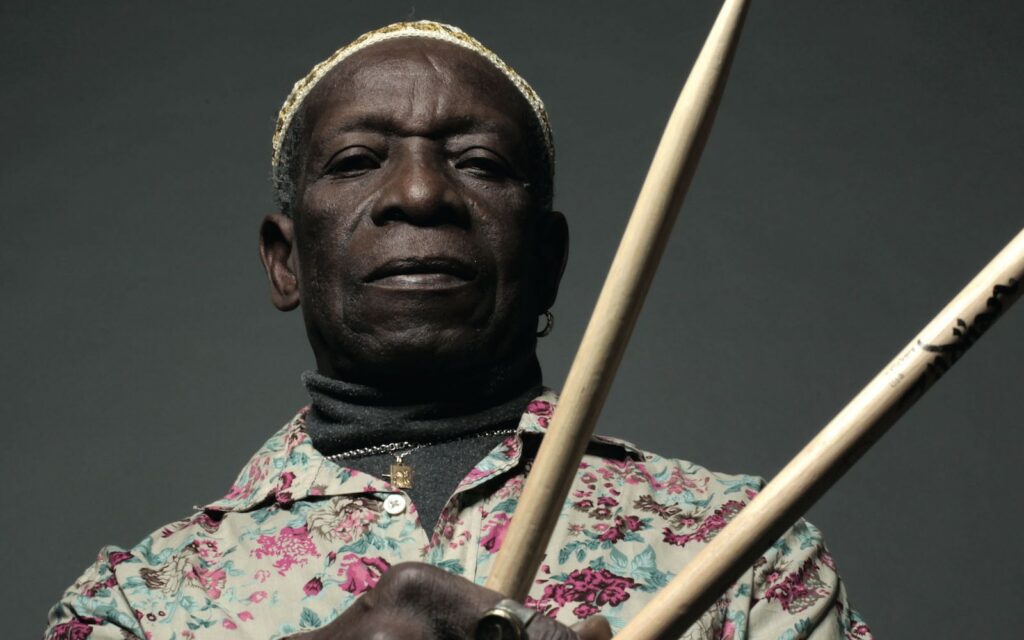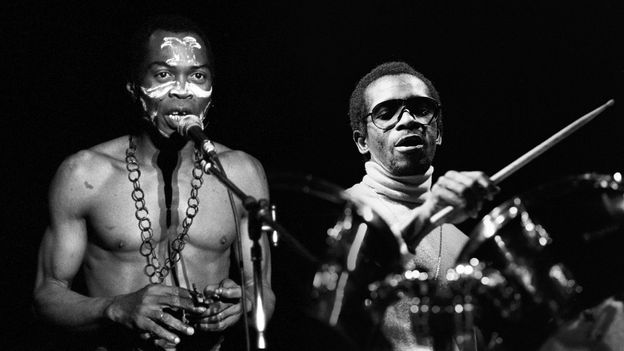Tony Allen: Pioneer Of The Afrobeat Drum Pattern
In modern Afrobeat music, certain figures stand out as true pioneers, reshaping genres and pushing the boundaries of creativity. Tony Allen, the legendary Nigerian drummer and composer, is undeniably one of these luminaries. Renowned for his innovative approach to rhythm and his pivotal role in shaping the Afrobeat genre, Tony Allen’s impact on the global music landscape is nothing short of remarkable.

Origins and Musical Journey
Born on August 12, 1940, in Lagos, Nigeria, Tony Oladipo Allen’s journey into music was both serendipitous and driven by his natural talent. His early exposure to traditional Nigerian rhythms and his fascination with drumming laid the foundation for his extraordinary career. Allen’s youthful explorations eventually led him to play for a variety of highlife and Afro-Cuban bands in Lagos during the 1950s and 1960s.
However, it was in the late 1960s that Allen’s destiny took a significant turn. He joined forces with Fela Kuti, a charismatic Nigerian musician, and together they embarked on a creative journey that would shape the future of music.
The Birth of Afrobeat
The collaboration between Tony Allen and Fela Kuti was a match made in musical heaven. Their combined talents led to the creation of Afrobeat, a genre that seamlessly blended traditional Nigerian rhythms, jazz, funk, and political commentary. Allen’s drumming became the heartbeat of Afrobeat, characterized by its intricate polyrhythms, hypnotic grooves, and social consciousness.

At the core of Afrobeat was Tony Allen’s unique approach to rhythm. He introduced a “skew” in his drum patterns, purposely displacing the snare and hi-hat notes to create a distinct syncopated feel. This innovative technique gave Afrobeat its signature groove, making it irresistible to audiences and musicians alike.
Innovation and Legacy
Tony Allen’s contributions to music extended far beyond his work with Fela Kuti. He continued to explore new sounds, collaborating with musicians from various genres, including jazz, electronica, and hip-hop. His solo albums, such as “No Discrimination” and “Lagos No Shaking,” showcased his ability to push musical boundaries while staying true to his Afrobeat roots.
As a drummer, Allen’s influence can be heard in the work of countless artists across the globe. His style resonated with musicians ranging from Talking Heads to Damon Albarn, and he even collaborated with the likes of Brian Eno and Gorillaz. His music inspired subsequent generations to experiment with rhythms and sounds, leading to the fusion of genres and the creation of new musical landscapes.
A Lasting Impact
Tony Allen’s passing on April 30, 2020, marked the end of an era, but his legacy continues to reverberate through the world of music. His contributions earned him the title of “Afrobeat’s First Drummer,” a testament to his pioneering spirit and his role in shaping a genre that transcends cultural and geographical boundaries.
In the wake of his passing, the music community came together to celebrate his life and contributions. From heartfelt tributes to new generations of musicians drawing inspiration from his work, Tony Allen’s impact remains palpable. His ability to blend tradition with innovation and to communicate through rhythm has left an indelible mark on music history.
Tony Allen – In Conclusion
Tony Allen’s journey from the bustling streets of Lagos to the international stage thanks to his invention of the Afrobeat Drum Pattern is a testament to the power of creativity and collaboration. As a pioneer of Afrobeat rhythm and innovation, his influence continues to shape the artistic landscape and challenge musicians to think beyond established norms. His legacy reminds us that music has the power to bridge cultures, inspire change, and create a lasting connection between people around the world.
Want To Make Good Afrobeat Music?
We offer top notch online Afrobeat music making services here at Freaksonar. Find our services below :